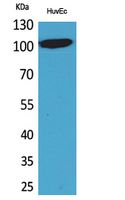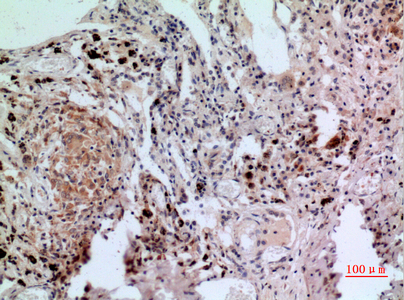

| WB | 咨询技术 | Human,Mouse,Rat |
| IF | 咨询技术 | Human,Mouse,Rat |
| IHC | 1/50-1/100 | Human,Mouse,Rat |
| ICC | 技术咨询 | Human,Mouse,Rat |
| FCM | 咨询技术 | Human,Mouse,Rat |
| Elisa | 1/10000 | Human,Mouse,Rat |
| Aliases | NFATC1; NFAT2; NFATC; Nuclear factor of activated T-cells; cytoplasmic 1; NF-ATc1; NFATc1; NFAT transcription complex cytosolic component; NF-ATc; NFATc |
| Entrez GeneID | 4772 |
| WB Predicted band size | Calculated MW: 101 kDa; Observed MW: 105 kDa |
| Host/Isotype | Rabbit IgG |
| Antibody Type | Primary antibody |
| Storage | Store at 4°C short term. Aliquot and store at -20°C long term. Avoid freeze/thaw cycles. |
| Species Reactivity | Human,Mouse |
| Immunogen | The antiserum was produced against synthesized peptide derived from the C-terminal region of human NFATC1. AA range:881-930 |
| Formulation | Purified antibody in PBS with 0.05% sodium azide,0.5%BSA and 50% glycerol. |
+ +
以下是关于NFAT2抗体的3篇代表性文献的简要整理:
---
1. **文献名称**:*NFAT Proteins: Key Regulators of T-Cell Development and Function*
**作者**:Rao, A., Luo, C., Hogan, P.G.
**摘要**:该综述详细阐述了NFAT家族(包括NFAT2)在T细胞激活、分化及免疫应答中的核心作用,强调了NFAT2抗体在染色质免疫共沉淀(ChIP)和Western blot实验中的应用,用于研究其核转位及DNA结合活性。
---
2. **文献名称**:*Calcineurin/NFAT Signaling in Lymphocyte Activation and Development*
**作者**:Macian, F., López-Rodríguez, C., Rao, A.
**摘要**:研究利用特异性NFAT2抗体揭示了其在T细胞受体(TCR)信号通路中的调控机制,发现NFAT2的磷酸化状态通过钙调神经磷酸酶调控,并影响细胞因子(如IL-2)的表达,抗体检测为关键实验依据。
---
3. **文献名称**:*Distinct Roles for NFAT1 and NFAT2 in Human Macrophage Differentiation and Inflammatory Responses*
**作者**:Müller, M.R., Rao, A.
**摘要**:通过NFAT2特异性抗体进行免疫荧光和流式细胞分析,研究发现NFAT2在巨噬细胞分化中调控炎症因子(如TNF-α、IL-6)的分泌,且在慢性炎症疾病中呈现异常激活状态。
---
**备注**:NFAT2(又名NFATC1)抗体常用于研究其亚细胞定位(如钙信号诱导的核转位)及基因调控功能,上述文献均依赖其特异性进行机制解析。建议根据具体实验需求(如物种、应用场景)进一步筛选抗体货号及验证数据。
The nuclear factor of activated T cells 2 (NFAT2), also known as NFATC1. is a transcription factor belonging to the NFAT family, which plays critical roles in immune response, cell differentiation, and development. NFAT2 is activated by calcium-dependent phosphatase calcineurin, which dephosphorylates it, enabling nuclear translocation to regulate gene expression. It is particularly vital in T-cell activation, cytokine production, and lymphocyte development. Dysregulation of NFAT2 has been implicated in autoimmune diseases, cancer, and inflammatory disorders.
Antibodies targeting NFAT2 are essential tools for studying its expression, localization, and function in both physiological and pathological contexts. These antibodies are widely used in techniques like Western blotting, immunohistochemistry, and flow cytometry to detect NFAT2 protein levels, cellular distribution, or post-translational modifications. Researchers often employ them to explore NFAT2’s role in immune cell signaling, its interaction with other transcription factors (e.g., AP-1), or its contribution to disease mechanisms. Specific NFAT2 antibodies may recognize distinct isoforms or phosphorylated forms, aiding in pathway-specific analyses. Validation in knockout models or siRNA-treated cells is critical to ensure antibody specificity, given structural similarities among NFAT family members. Such reagents have advanced studies in immunology, oncology, and drug development, particularly in therapies targeting calcineurin-NFAT signaling.
×